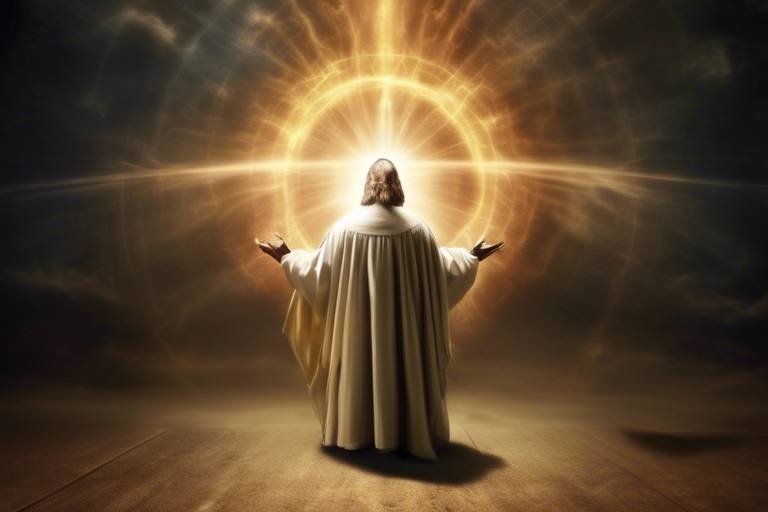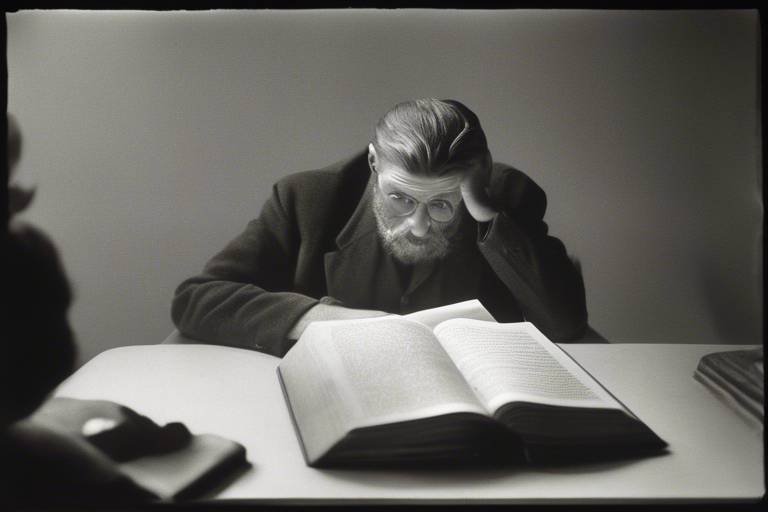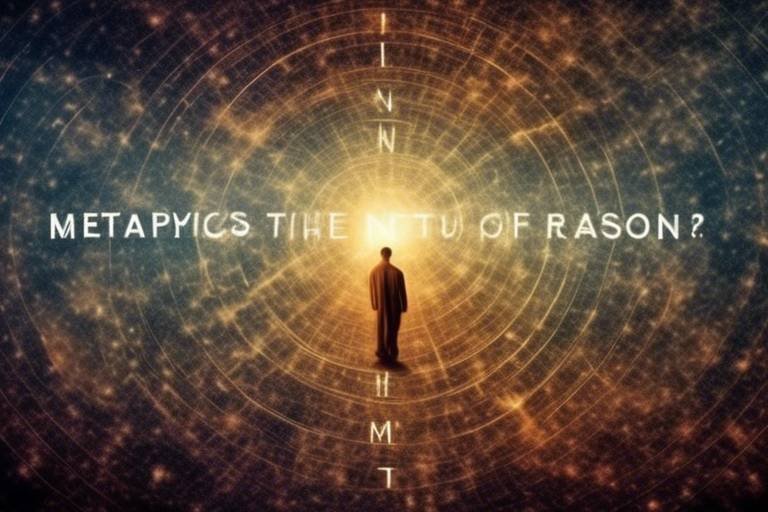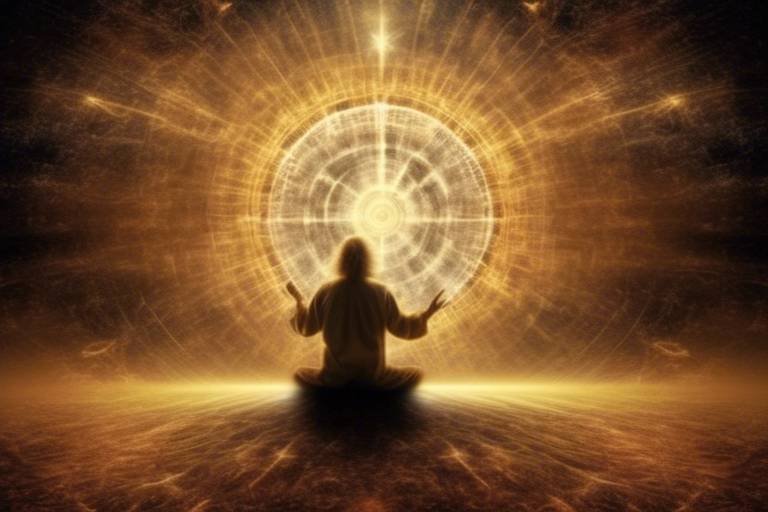Are Metaphysics and Theology Intrinsically Linked?
The relationship between metaphysics and theology is a fascinating topic that has intrigued philosophers, theologians, and thinkers for centuries. At first glance, one might wonder if these two fields are merely parallel tracks, each exploring different aspects of existence and reality. However, a deeper dive reveals that they are more like intertwined vines, each influencing and shaping the other in profound ways. Imagine standing at the crossroads of existence, where metaphysics offers a map of the universe while theology provides the compass guiding our moral and spiritual journey. This article aims to unravel the intricate connections between these two domains, highlighting how they converge in their quest for understanding the divine and the nature of reality.
To grasp the essence of their relationship, we must first define what we mean by metaphysics and theology. Metaphysics, a branch of philosophy, delves into the fundamental nature of reality, asking questions about being, existence, and the universe itself. It seeks to understand the underlying principles that govern everything we perceive. On the other hand, theology focuses on the divine, exploring the nature of God and the spiritual matters that affect human existence. When we consider these definitions, it becomes clear that both metaphysics and theology grapple with the same existential questions, albeit from different angles.
As we explore the intersection of these concepts, we find that both metaphysics and theology deal with profound inquiries about existence and reality. They often overlap in their investigations, with metaphysical principles informing theological beliefs and vice versa. For instance, metaphysical discussions about the nature of being can have significant implications for our understanding of God. If we consider God to be the ultimate being, then metaphysical concepts become essential in framing our comprehension of the divine. Similarly, theological insights can enrich metaphysical discussions by providing a spiritual context to abstract concepts.
One of the most critical areas where these fields intersect is in the notions of existence and being. Both metaphysics and theology place great emphasis on these concepts, shaping our understanding of the universe and our place within it. By exploring how these ideas influence each other, we can gain valuable insights into the interconnectedness of all things. For instance, if we accept that everything that exists has a purpose, as many theological frameworks suggest, we can begin to see how metaphysical theories about existence can lead us to a deeper understanding of our own lives.
Moreover, the nature of reality itself is a pivotal topic in both metaphysics and theology. Metaphysical theories about the structure of reality can significantly influence theological perspectives. For example, if reality is seen as a single, unified whole, this could shape our understanding of God as an all-encompassing presence. Conversely, theological beliefs can also impact how we interpret metaphysical ideas, as they often provide a moral and ethical framework through which we view existence.
Throughout history, philosophers have engaged in a rich dialogue about the ties between metaphysics and theology. Thinkers such as Aristotle, Thomas Aquinas, and Immanuel Kant have each contributed to this ongoing conversation, offering unique perspectives that illustrate the relevance of these fields in understanding existence. Their works demonstrate that the interplay between metaphysics and theology is not merely academic but has profound implications for how we live our lives and understand our place in the cosmos.
In today's world, the relationship between metaphysics and theology continues to evolve, raising contemporary issues and debates that are relevant to modern philosophical discussions. As we grapple with questions about the nature of reality in an age of scientific discovery, the insights from both fields can provide a richer understanding of our existence. Whether we are pondering the implications of quantum physics or the moral dimensions of artificial intelligence, the dialogue between metaphysics and theology remains crucial in navigating the complexities of modern life.
- What is the main difference between metaphysics and theology? Metaphysics focuses on the fundamental nature of reality and existence, while theology studies the divine and religious beliefs.
- How do metaphysics and theology influence each other? Metaphysical principles can inform theological beliefs, while theological insights can enrich metaphysical discussions.
- Why is the relationship between metaphysics and theology important? Understanding their connection helps us explore profound questions about existence, purpose, and the nature of reality.

Defining Metaphysics
Metaphysics is a fascinating branch of philosophy that dives deep into the fundamental nature of reality. Think of it as the philosophical detective work that tries to unravel the mysteries behind existence, being, and the universe itself. At its core, metaphysics asks the big questions: What is there? What is it like? And how does it all fit together? These inquiries are not just abstract musings; they are foundational to our understanding of everything around us. Imagine standing at the edge of a vast ocean, staring into the depths, wondering what lies beneath the surface. That’s metaphysics for you—an exploration of the unseen and the unknown.
One of the key concepts in metaphysics is ontology, which is the study of being and existence. Ontology helps us categorize and understand the different kinds of entities that populate our reality. For instance, consider the distinction between physical objects, like a chair, and abstract concepts, like love or justice. Each of these exists in different ways, and understanding their nature is crucial for metaphysical inquiry. Additionally, metaphysics delves into questions of causality, space, and time, examining how these elements interact and shape our understanding of the universe.
To further illustrate the complexities of metaphysics, let’s break down some of its core principles:
- Existence: What does it mean for something to exist?
- Identity: How do we define and understand the identity of objects and beings?
- Change: How do entities change over time, and what does that mean for their existence?
- Possibility: What is possible versus what is actual?
These principles serve as the building blocks for metaphysical thought, allowing philosophers to construct frameworks that help us make sense of our experiences. When we ponder the nature of reality, we are not merely engaging in philosophical speculation; we are laying the groundwork for deeper inquiries that often lead us to theological considerations. After all, if we are to understand the divine, we must first grapple with what existence itself means. In essence, metaphysics is not just an academic exercise; it is a vital exploration that connects us to the larger questions of life and our place in the universe.

Defining Theology
Theology is a fascinating field that dives deep into the essence of the divine, exploring the beliefs and practices that surround spirituality and religion. At its core, theology seeks to answer some of the most profound questions humanity has ever faced: What is the nature of God? What is our purpose in this world? How do spiritual beliefs shape our understanding of existence? These inquiries are not just academic; they resonate with the very fabric of human experience.
In its broadest sense, theology can be understood as the study of the divine and the principles that govern religious faith. It delves into sacred texts, traditions, and doctrines, offering insights into how different cultures perceive the divine. Theologians often engage with a variety of sources, including scripture, philosophy, and historical context, to construct a comprehensive view of spiritual matters. This multifaceted approach allows for a rich exploration of various religious perspectives, from monotheism to polytheism, and even atheism.
One of the essential elements of theology is its ability to bridge the gap between abstract concepts and practical implications. For instance, consider the following aspects:
- Revelation: How do we come to know the divine? Theologians examine the ways in which God reveals Himself to humanity, whether through sacred texts, nature, or personal experiences.
- Faith: What role does faith play in understanding the divine? Theology explores how belief systems shape individual and collective identities.
- Moral Implications: How do theological beliefs influence ethical behavior? Theologians often grapple with the relationship between divine commandments and human morality.
Moreover, theology is not static; it evolves with time and culture. As societies change, so do their interpretations of the divine. This dynamic nature of theology invites ongoing dialogue and debate, making it an ever-relevant field of study. The intersection of theology with other disciplines, such as metaphysics, further enriches its exploration of existence and the divine.
In essence, theology serves as a lens through which we can examine the complexities of faith and spirituality. It invites us to ponder the mysteries of existence and encourages a deeper understanding of our place in the universe. By engaging with theological concepts, individuals can find a sense of purpose and connection to something greater than themselves.

The Intersection of Concepts
At first glance, metaphysics and theology may seem like two separate realms, each with its own set of questions and concerns. However, when you dig deeper, you'll find that they are intricately intertwined, both probing the fundamental mysteries of existence and reality. Think of metaphysics as the foundation of a house, while theology is the beautifully decorated interior. Without the sturdy base, the ornate rooms would crumble, and without the interior, the structure would lack purpose. This analogy highlights how these fields complement and enrich each other.
Both metaphysics and theology grapple with profound questions that shape our understanding of the universe. For instance, they both ask, "What is the nature of existence?" and "What does it mean to be?" These inquiries are not just academic; they resonate deeply within our lives, influencing our beliefs, values, and even our daily choices. The intersection of these concepts often leads to a richer comprehension of life's complexities.
One of the most compelling areas where metaphysics and theology converge is in the exploration of existence and being. Metaphysics dives into the essence of what it means to exist, while theology seeks to understand the divine being—God. This overlap raises intriguing questions: If God exists, what does that imply about the nature of reality? Conversely, if reality is fundamentally material, how does that affect our understanding of the divine? These questions form a dialogue that challenges us to think critically about our beliefs.
Moreover, the nature of reality itself is a pivotal topic in both fields. Metaphysical theories, such as idealism and realism, influence how we interpret theological doctrines. For example, if one subscribes to a metaphysical view that reality is primarily a construct of the mind, it may lead to a more subjective interpretation of divine experiences. On the other hand, a robust theological perspective might argue for an objective reality that underpins spiritual truths, thus influencing metaphysical discourse.
Ultimately, the intersection of metaphysics and theology is not just an academic exercise; it’s a journey into understanding our place in the universe. It invites us to ponder the big questions: Are we merely products of chance, or is there a divine purpose guiding our existence? This exploration fosters a holistic view that embraces the complexities of life, encouraging us to seek answers that resonate on both intellectual and spiritual levels.
As we continue to navigate the intricate relationship between these two fields, it becomes evident that they are not only relevant but essential in our quest for understanding. The dialogue between metaphysics and theology enriches our perspectives, urging us to explore the depths of existence and the mysteries of the divine.
- What is the primary focus of metaphysics? Metaphysics primarily investigates the fundamental nature of reality, including concepts like existence, being, and the universe.
- How does theology differ from metaphysics? Theology focuses on the study of the divine and religious beliefs, while metaphysics deals with broader questions about existence and reality.
- Can metaphysics and theology coexist? Yes, they can coexist and often enhance each other by providing a more comprehensive understanding of existence and the divine.
- What are some key questions explored in both fields? Both fields explore questions like "What is existence?" and "What is the nature of reality?"

Existence and Being
The concepts of existence and being are not just abstract ideas; they are the very foundation upon which metaphysics and theology build their understanding of the universe and the divine. To put it simply, existence refers to the state of being real or having an actual presence in the world, while being encompasses the essence of what something is. Imagine existence as the canvas on which the vibrant colors of being are painted. Without existence, being would have no place to manifest. This relationship sparks profound questions: What does it mean to exist? How do we define the essence of God or any entity within the cosmos?
In metaphysics, exploring existence often leads us to ponder the nature of reality itself. Philosophers like René Descartes famously declared, "I think, therefore I am," which suggests that the very act of thinking is proof of existence. This assertion opens the door to a deeper examination of what it means to be. In theology, the exploration of being takes on a different hue, as it seeks to understand the nature of God. Is God an existing being like us, or is He something entirely different, transcending our earthly definitions? This inquiry leads to a rich tapestry of thought where metaphysics and theology intertwine.
To further illustrate this interplay, consider the following table that summarizes key distinctions and connections between existence and being in both fields:
| Aspect | Metaphysics | Theology |
|---|---|---|
| Definition | Study of what it means to exist | Study of the divine and spiritual existence |
| Key Questions | What is the nature of reality? | What is the nature of God? |
| Focus | Existence of all entities | Existence of the divine |
The implications of these concepts stretch far beyond academic discussions; they resonate deeply within our daily lives. For instance, when we ponder our purpose or grapple with existential crises, we are engaging in a dialogue that is as much metaphysical as it is theological. This intersection compels us to ask ourselves: Are we simply existing, or are we truly being? In essence, understanding existence and being allows us to navigate our own lives with a greater sense of purpose and connection to the universe.
Moreover, in the realm of theology, the questions surrounding existence and being often lead to discussions about the nature of the soul and its relationship to the divine. Is the soul merely a product of biological existence, or does it possess a being that transcends physicality? Such inquiries highlight the intricate dance between these two fields, inviting us to explore the depths of our own beliefs and experiences.
In conclusion, the exploration of existence and being serves as a bridge between metaphysics and theology, illuminating our understanding of reality and the divine. By delving into these concepts, we not only enrich our intellectual pursuits but also deepen our personal reflections on what it means to exist and to be. As we continue this journey, we find that the questions we ask are just as important as the answers we seek, leading us to a more profound comprehension of ourselves and the universe around us.

Nature of Reality
The is a profound topic that sits at the crossroads of metaphysics and theology, inviting us to explore the very essence of existence itself. When we ponder what is real, we often find ourselves grappling with questions that seem to transcend the boundaries of human understanding. Is reality merely a construct of our perceptions, or is there an objective truth that exists independently of our beliefs? This inquiry is not just an intellectual exercise; it touches on the core of our being and our relationship with the universe.
In metaphysics, reality is often dissected into various components, such as substance, attributes, and relations. Philosophers like Aristotle proposed that everything that exists can be categorized into substances, which are the fundamental entities of reality. This perspective invites us to consider how these substances interact and form the fabric of our universe. On the other hand, theology introduces a divine dimension to our understanding of reality. Theological perspectives assert that a higher power, often referred to as God, plays a crucial role in shaping the reality we experience. This brings forth the idea that reality is not just a physical phenomenon but also a spiritual one, intertwined with the divine will.
Moreover, the relationship between metaphysics and theology can be illustrated through their respective approaches to understanding existence. While metaphysics often relies on reason and logical analysis, theology may invoke faith and spiritual insight. This dichotomy raises intriguing questions: Can reason alone lead us to a complete understanding of reality? Or do we need faith to grasp the deeper truths that lie beyond empirical observation? This interplay between reason and faith is where the dialogue between metaphysics and theology becomes particularly rich.
To further illustrate this connection, consider the following table that summarizes key differences and intersections between metaphysical and theological views on reality:
| Aspect | Metaphysical Perspective | Theological Perspective |
|---|---|---|
| Definition of Reality | Reality is composed of substances and their interactions. | Reality is shaped by divine will and spiritual truths. |
| Method of Inquiry | Logical reasoning and empirical observation. | Faith, revelation, and spiritual insight. |
| Nature of Existence | Existence can be understood through philosophical analysis. | Existence is a gift from a higher power. |
As we navigate through these complex ideas, it becomes evident that our understanding of reality is not static; it evolves as we engage with both metaphysical reasoning and theological reflection. This dynamic relationship encourages us to remain open-minded and curious, prompting us to ask deeper questions about our existence and the universe around us. Ultimately, the nature of reality invites us to embark on a journey of exploration, one that intertwines philosophical inquiry with spiritual discovery, leading us toward a more holistic understanding of life itself.
- What is the main difference between metaphysics and theology? Metaphysics focuses on the fundamental nature of reality and existence, while theology specifically studies the divine and religious beliefs.
- How do metaphysics and theology influence each other? Metaphysical theories can shape theological perspectives and vice versa, creating a rich dialogue about existence and the nature of reality.
- Can one understand reality without considering both metaphysical and theological perspectives? While it is possible to explore reality from a purely metaphysical standpoint, incorporating theological insights can provide a more comprehensive understanding of existence.

Philosophical Perspectives
The intertwining of metaphysics and theology has been a focal point of philosophical inquiry for centuries. Thinkers from various epochs have grappled with the profound questions that arise at this intersection. For instance, the ancient Greek philosopher Plato posited that beyond the physical world lies a realm of perfect forms, which can be interpreted as a metaphysical foundation for understanding the divine. His allegory of the cave illustrates how our perception of reality is limited, urging us to seek deeper truths that may align with theological insights about God and existence.
Moving forward in history, Aristotle introduced a more empirical approach to metaphysics, emphasizing the importance of substance and causality. His ideas laid the groundwork for later theological discussions, particularly in the context of the Christian tradition, where his concept of the "unmoved mover" was adapted to describe God as the ultimate cause of existence. This philosophical perspective not only enriches our understanding of metaphysics but also frames theological discourse around the nature of divine causation and existence.
Fast forward to the medieval period, and we encounter philosophers like Aquinas, who sought to reconcile faith with reason. He argued that while divine revelation provides knowledge about God, metaphysical reasoning is essential for understanding the nature of existence. Aquinas' famous Five Ways serve as a bridge between metaphysical inquiry and theological assertions, illustrating how philosophical reasoning can lead one to acknowledge the existence of God. His work exemplifies how metaphysics can provide a rational foundation for theological beliefs, thus highlighting their intrinsic connection.
In the modern era, thinkers such as Immanuel Kant challenged traditional metaphysical claims, arguing that our understanding of reality is shaped by our perceptions rather than an objective reality. Kant's critique of pure reason invites a re-examination of how theology can be understood in light of human cognition. He proposed that while we may not grasp the essence of the divine directly, we can still engage with theological concepts through moral and ethical frameworks derived from our metaphysical understanding of the world.
These philosophical perspectives underscore an essential truth: the dialogue between metaphysics and theology is not merely academic; it is a dynamic interplay that shapes our understanding of existence, purpose, and the divine. As we continue to explore these disciplines, it's crucial to recognize how each perspective contributes to a broader comprehension of our universe and our place within it.
- What is the primary focus of metaphysics? Metaphysics primarily investigates the fundamental nature of reality, including concepts of being, existence, and the universe.
- How does theology relate to metaphysics? Theology seeks to understand the nature of God and spiritual matters, often drawing upon metaphysical concepts to frame its inquiries about existence and purpose.
- Why is the relationship between metaphysics and theology important? Understanding their relationship helps us address profound questions about existence, reality, and the divine, enriching both philosophical and theological discourse.

Historical Context
The historical context of metaphysics and theology is rich and intricate, revealing how these two fields have evolved alongside each other throughout the centuries. To truly appreciate their relationship, we must delve into the key moments and figures that have shaped their discourse. From the ancient philosophers of Greece to the theologians of the Middle Ages, the dialogue between metaphysics and theology has been a continuous thread in the tapestry of human thought.
In ancient times, philosophers like Plato and Aristotle laid the groundwork for metaphysical inquiry. Plato's theory of forms proposed that the material world is but a shadow of a higher reality, a notion that would later influence theological thought regarding the nature of God and the divine. Aristotle, on the other hand, emphasized substance and essence, contributing to our understanding of existence itself. These early ideas set the stage for later theological interpretations, where the nature of God was often discussed in metaphysical terms.
As we move into the Middle Ages, the interplay between metaphysics and theology becomes even more pronounced. Thinkers such as Augustine and Aquinas sought to reconcile faith with reason, drawing heavily on metaphysical concepts to explain theological doctrines. For instance, Aquinas' Five Ways are not just arguments for the existence of God; they are deeply rooted in metaphysical principles concerning causality and existence. This era marked a significant turning point where metaphysical inquiries were often framed within a theological context, demonstrating their intrinsic link.
Fast forward to the Enlightenment and the rise of modern philosophy, where figures like Descartes and Kant challenged traditional views. Descartes famously stated, "I think, therefore I am," emphasizing the importance of consciousness in understanding existence. His dualism introduced a new perspective on the relationship between the mind and body, leading to metaphysical questions about the nature of reality that theologians had to grapple with. Kant, meanwhile, argued that our understanding of the divine is limited by our perceptions, raising profound questions about the nature of reality and its connection to theology.
In contemporary times, the dialogue between metaphysics and theology continues to flourish. Modern philosophers and theologians tackle issues such as existentialism, the nature of consciousness, and the implications of quantum physics on our understanding of reality. This ongoing evolution highlights the relevance of both fields in addressing the fundamental questions of existence, purpose, and the divine.
To summarize, the historical context of metaphysics and theology is marked by a rich interplay of ideas and figures that have shaped our understanding of existence. The evolution of these disciplines reflects a continuous quest for knowledge and understanding, demonstrating that while they may be distinct in their inquiries, they are undeniably intertwined in their exploration of reality.
- What is the main difference between metaphysics and theology? Metaphysics deals with the fundamental nature of reality and existence, while theology focuses on the study of the divine and religious beliefs.
- How do metaphysics and theology influence each other? Metaphysical concepts often inform theological perspectives, shaping our understanding of God and existence, while theological beliefs can guide metaphysical inquiries.
- Can metaphysics exist without theology, and vice versa? While they can be studied independently, their intertwined nature suggests that a comprehensive understanding of existence often requires insights from both fields.

Influential Thinkers
The interplay between metaphysics and theology has been profoundly shaped by a myriad of influential thinkers throughout history. These intellectual giants have not only posed critical questions but have also provided frameworks that allow us to explore the depths of existence and the divine. One such figure is Aristotle, whose work laid the groundwork for metaphysical inquiry. His concept of the "Unmoved Mover" presents an essential argument for the existence of a primary cause, which has significant implications for theological discussions about God. Aristotle's ideas influenced later theologians like Aquinas, who sought to reconcile Aristotelian philosophy with Christian doctrine, forming a bridge between metaphysical inquiry and theological understanding.
Moving forward in history, we encounter Immanuel Kant, who challenged the traditional metaphysical frameworks by proposing that our understanding of reality is limited by our perceptions. Kant's critical philosophy suggests that while we can know phenomena (the world as we experience it), the noumena (the world as it is in itself) remains elusive. This raises intriguing questions for theology, particularly concerning the nature of divine revelation and the limits of human understanding. Kant's work invites us to consider whether our theological concepts are merely constructs shaped by our experiences of the world.
Another pivotal thinker is Martin Heidegger, who shifted the focus of metaphysics from abstract reasoning to the lived experience of being. He emphasized the importance of "Being" itself, which has profound implications for theology. Heidegger's existential approach encourages us to explore our relationship with the divine in a more personal and immediate way, challenging traditional theological constructs that may feel distant or abstract. His work prompts us to ask: How do our individual experiences of existence shape our understanding of God?
In modern times, philosophers like Alfred North Whitehead have contributed to the dialogue between metaphysics and theology through process philosophy. Whitehead posits that reality is not static but is instead a dynamic process of becoming. This perspective aligns well with various theological views that emphasize the relational nature of God and creation. By viewing existence as a process, Whitehead invites us to reconsider our understanding of divine action in the world, suggesting that God is not merely an observer but an active participant in the unfolding of reality.
These thinkers, among many others, illustrate the rich tapestry of ideas that connect metaphysics and theology. Their contributions have not only shaped philosophical discourse but have also influenced how we grapple with the profound questions of existence, purpose, and the nature of the divine. As we continue to explore these intersections, we must recognize that the dialogue is ongoing, with each new generation of thinkers adding their unique perspectives to this ever-evolving conversation.
- What is the main difference between metaphysics and theology? Metaphysics deals with the fundamental nature of reality and existence, while theology focuses on the study of the divine and religious beliefs.
- How do influential thinkers shape our understanding of these fields? Influential thinkers provide frameworks and questions that help us explore complex ideas related to existence and the divine, often leading to new interpretations and understandings.
- Can metaphysics exist without theology, or vice versa? While they can be studied independently, metaphysics and theology often intersect, influencing each other in significant ways.

Modern Implications
In today's fast-paced world, the relationship between metaphysics and theology is more relevant than ever. As we grapple with profound questions about existence, purpose, and the nature of reality, these two fields provide a rich tapestry of insights that can help us navigate contemporary challenges. The intersection of metaphysics and theology isn't just a dusty academic debate; it has real-world implications that affect how we understand ourselves and our place in the universe.
One of the most pressing modern implications arises from the ongoing dialogue about the existence of God. In an age dominated by scientific inquiry and technological advancement, many people find themselves questioning traditional theological views. Metaphysics offers a framework for exploring these questions by examining the underlying principles that govern existence. For instance, the metaphysical concept of causality can lead to discussions about whether the universe requires a divine cause or if it can exist independently. This debate is not merely theoretical; it influences how individuals and societies approach morality, ethics, and the meaning of life.
Moreover, the rise of existential philosophy has brought new dimensions to the conversation. Thinkers like Jean-Paul Sartre and Martin Heidegger challenge us to confront the absurdity of existence, pushing us to find personal meaning in a seemingly indifferent universe. Here, metaphysics and theology intersect in fascinating ways, as individuals seek to reconcile their existential dilemmas with their spiritual beliefs. Are we merely products of chance, or is there a divine purpose guiding our lives? This question remains at the forefront of modern philosophical discussions, highlighting the enduring relevance of both fields.
Additionally, the advent of postmodernism has further complicated the relationship between metaphysics and theology. In a world where absolute truths are increasingly questioned, the metaphysical foundations of religious beliefs are scrutinized. This has led to a rise in pluralism, where multiple perspectives coalesce, challenging traditional theological doctrines. The implications of this shift are profound, as they encourage dialogue and understanding among diverse belief systems. As a result, people are more inclined to explore the metaphysical underpinnings of various religions, seeking common ground amidst differences.
To illustrate the modern implications of this relationship, consider the following table that outlines key areas of intersection:
| Area of Intersection | Metaphysical Inquiry | Theological Implication |
|---|---|---|
| Existence of God | Exploration of causality and existence | Understanding divine nature and presence |
| Meaning of Life | Questions of purpose and existence | Spiritual beliefs and ethical frameworks |
| Pluralism | Examination of multiple realities | Dialogue among diverse religions |
As we continue to explore these modern implications, it becomes clear that the dialogue between metaphysics and theology is crucial for addressing the complexities of contemporary life. It encourages us to ask the tough questions and seek deeper understanding, ultimately enriching our experience of existence. In a world that often feels chaotic and disconnected, the insights gained from both fields can provide a sense of coherence and purpose.
- What is the primary focus of metaphysics? Metaphysics primarily investigates the fundamental nature of reality, including concepts like existence, being, and the universe.
- How does theology relate to metaphysics? Theology studies the divine and religious beliefs, often intersecting with metaphysical inquiries about existence and purpose.
- Why is the relationship between metaphysics and theology important today? This relationship helps address modern existential questions, providing insights that can guide ethical and moral decision-making.
- Can metaphysics and theology coexist with scientific inquiry? Yes, many believe that metaphysical and theological perspectives can complement scientific understanding, offering deeper insights into existence.
Frequently Asked Questions
- What is the primary difference between metaphysics and theology?
Metaphysics is primarily concerned with the fundamental nature of reality, exploring concepts like being and existence. Theology, on the other hand, focuses on the divine, studying religious beliefs and the nature of God. While they intersect, their core focuses are quite distinct.
- How do metaphysics and theology influence each other?
These two fields often overlap in their inquiries about existence and reality. For instance, metaphysical theories can shape theological perspectives by providing a framework for understanding the divine, while theological beliefs can influence metaphysical discussions about the nature of reality.
- Can metaphysics provide evidence for the existence of God?
Metaphysics can offer philosophical arguments that support the existence of a higher power, such as the cosmological and ontological arguments. However, the evidence is often abstract and debated, making it a complex topic within both metaphysics and theology.
- Are there any historical figures who significantly contributed to the link between metaphysics and theology?
Yes, philosophers like St. Augustine, Thomas Aquinas, and Immanuel Kant have made substantial contributions to the discussion of metaphysics and theology. Their works have shaped how we understand the relationship between existence, God, and reality.
- How does modern philosophy view the relationship between metaphysics and theology?
Modern philosophy continues to explore the ties between metaphysics and theology, often questioning traditional beliefs and examining new perspectives. Contemporary debates focus on the implications of this relationship for understanding existence and the relevance of divine concepts in today’s world.
- Is it possible to study metaphysics and theology separately?
While it is possible to study them separately, understanding their interconnectedness can provide a deeper insight into both fields. The questions they address often complement each other, enriching the overall discourse on existence and the divine.



















